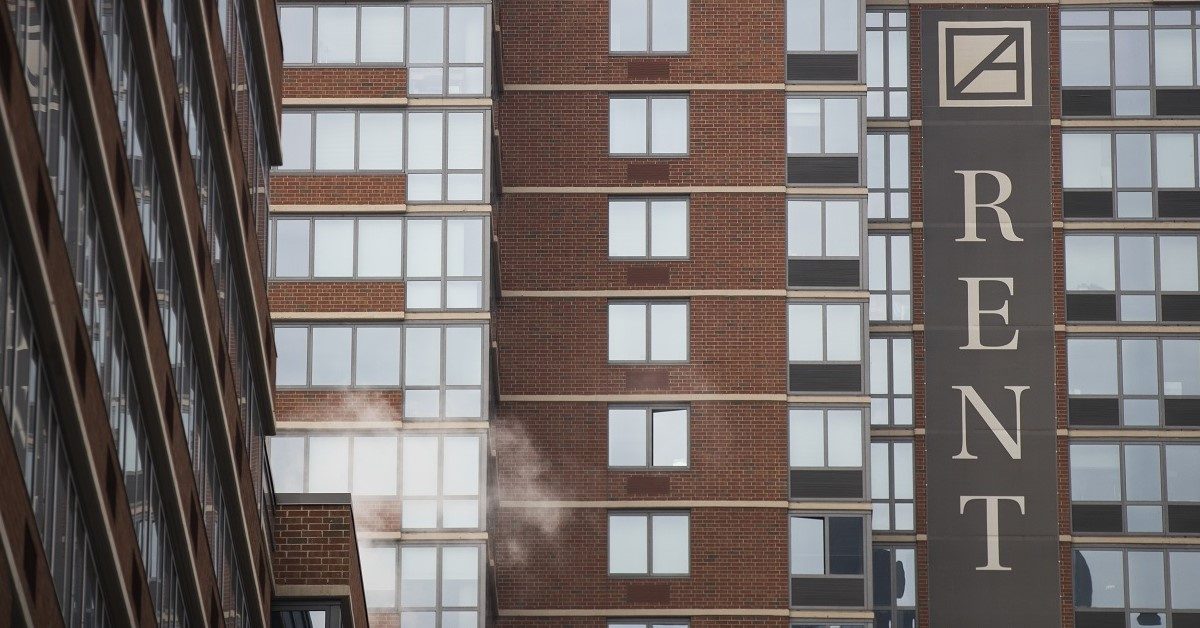Since the beginning of the pandemic, NAR's advocacy and leadership teams met have with Congressional leaders and White House officials to help craft a solution to the escalating commercial real estate crisis. As a result, more than $46 billion in rental assistance was secured through two separate pieces of legislation, each dollar of which was intended to keep families in their homes and mom-and-pop landlords afloat. The following articles showcase this issue in the media and how various groups are being harmed.
Please note: The Supreme Court ruled on August 26, 2021 that the latest federal eviction moratorium extension was unlawful. Housing providers should keep in mind that some state and local governments may still have their own eviction moratoria in place that may still be in effect.
Media Articles on the Eviction Moratorium
'We're drowning': Small landlords squeezed by eviction ban, slow aid (Politico, Aug 14, 2021)
Washington's pandemic response is battering the finances of independent landlords, most of whom haven't received federal rental aid designed to keep them whole during a nearly year-long eviction ban that has forced some property owners to house tenants for free. The distress is acute for so-called mom-and-pop landlords — those who own fewer than 10 properties, which typically have between one and four units. They supply about half the housing stock in the country, and they're more likely than corporate property managers to have lower-income tenants who've fallen behind on their rent as a result of Covid-19.
With tenants who won't pay or leave, small landlords face struggles of their own (MSN.com, Aug 10, 2021)
Jennifer Collins of Lahaina, Hawaii, lost her job as a restaurant server during the pandemic but hoped to stay afloat on rent she collects from three small condos she owns. Things didn't go as planned. Collins, 61, said one of her tenants has largely abandoned Collins's condo for another home and purchased a new automobile but refuses to either pay rent or leave Collins's property, even changing the locks so Collins could not access it. Collins has attempted to evict the tenant but said she has so far been unsuccessful.
The eviction moratorium is killing small landlords,' says one, as ban is extended another month (CNBC.com, June 25, 2021)
The majority of the nation's landlords are individual investors. They own about 23 million units in 17 million properties, according to the U.S. Census. More than 6 million renter households are behind on rent, also according to the Census. Landlords have next to no recourse. Howard Simon owns a small building in Massachusetts with three rental units. He hasn't received the rent on one of them since last October and is out about $7,000 so far. “I have mortgages, I have expenses for repairs to that particular building, I'm losing one-third of the rent just because of this,” said Simon. “And you know the other tenants who are occupying the other two units, they're trying their hardest and doing their best.” Simon has contacted the delinquent tenants but said they will not respond, nor will they apply for the aid available to them.
You Paid For It: St. Louis sheriff admits landlord got a bad deal with eviction moratorium (Fox TV St. Louis, Apr. 19, 2021)
Sheriff Vernon Betts has the unenviable task of serving eviction notices and force families from their houses. But that job has been suspended because of the pandemic. St. Louis Circuit Court Presiding Judge Michael Stelzer barred most evictions. Landlord Allen Shelton says his tenant won't pay. He says he no long had money to keep making improvements on the building. To make matters worse, the pipes froze and water got on the electrical boxes, shorting out the power to the first-floor tenant, who Allen says wasn't paying rent. When the city building inspector came, Shelton told him to just condemn the building. But the building inspector just condemned the second floor and not the first floor where the nonpaying tenant lived.
The $50 billion race to save America's renters from eviction (The Washington Post, Apr. 8, 2021)
The National Association of Home Builders joined Ohio landlords in another suit. The judge in that case, J. Philip Calabrese, also ruled against the ban, writing March 10 that “the CDC's orders exceeded the statutory authority Congress gave the agency.” Tenants' advocates and apartment company lobbyists alike celebrated when the federal government approved about $46.5 billion in emergency rental aid to be distributed to renters and landlords through hundreds of state, local and tribal housing agencies and organizations. But quickly and efficiently disbursing so much money is no straightforward task. Yentel said recently that only about half the states have created a program to do so. Some landlords have begun saying they won't accept the money out of concern that too many strings are attached.
Eviction moratorium: Landlords pay a price (Washington Examiner, Apr. 1, 2021)
While acknowledging the plight of tenants, many local, state, and federal government agencies appear dismissive of the plight of small-time landlords, such as Rich Tyson of Rochester, New York. “My property tax by liability per year is approximately $58,000. I've lost more than that year to date from tenants, not affected by COVID, but who simply have chosen not to pay rent. ... I've lost… $60,000 this year in rents that are… never going to get recouped,” said Tyson.
Eviction moratorium a burden for landlords (Las Vegas Review Journal, Apr. 1, 2021)
Any experienced property manager will tell you that once a tenant owes a month or more of rent, the tenant, no matter how well-meaning, won't be able to make up the unpaid balance. Experienced managers will skip legal action and make it attractive for the tenant to find more suitable and affordable housing and eat the loss when they realize the tenant can't pay.
Illinois eviction moratorium for renters likely to extend, but don't get too far behind (ABC TV Chicago, Mar. 31, 2021)
The hold on evictions in Illinois is likely to continue following CDC guidance of a moratorium on evictions until June 30, but it's important to not fall too far behind. The moratorium may give tenants some room to breathe, but on the other side are property owners. The most impacted are those with small buildings, for whom going without income can also be difficult. "If someone has four units and they have one or two tenants that are not paying, that becomes a significant portion of their investment," said Paul Arena, Illinois Rental Property Owners Association.
Keep Washington's Mom-and-Pop Landlords in Business (The Seattle Times, Mar. 29, 2021)
State leaders are right to prevent pandemic-related residential evictions. Droves of Washingtonians shouldn't be turned out into the street when eviction moratoriums eventually expire. But landlords aren't the big bad wolf in every story. Often, they're small business owners struggling to pay their own bills. These days, many are wondering if the investment is worth the risk. Washington's policymakers should encourage these entrepreneurs instead of driving them away.
Some landlords sell properties as CDC extends eviction ban (CNBC, Mar. 29, 2021)
A federal ban on evictions is putting the squeeze on smaller landlords, who are unable to directly access Covid rental relief funds, and some are starting to sell properties to recoup losses. This will likely reduce the much-needed, affordable rental stock in an already unaffordable housing market.
Small landlords left struggling when renters stop paying (California Matters, Mar. 17, 2021)At the start of the pandemic, Brandon McCall's two tenants ran into financial trouble. One had surgery, and went on disability, which tightened his purse strings.With a limited amount of cash coming in, McCall said the two of them stopped paying rent on his Van Nuys condo in Los Angeles. McCall looked into mortgage forbearance, but decided to pass when he learned it would impact his credit. He would also have to pay in full after his deferral period was up. Unsure when the tenants would start paying again, McCall and his wife dipped into savings to cover the mortgage on their condo even as they rent elsewhere for work. “Landlords rights and tenants rights are the same thing,” McCall said. “They're often pitted against each other, but they're the same thing. … I want to stay housed. I want to keep my tenants housed. We're all in this together.”
Who's Looking Out For Struggling Property Owners (Nevada Independent, Mar. 12, 2021)
I am a landlord with one property rented out to a tenant. My savings is being seriously depleted. Why, you ask? Because my tenant hasn't paid his rent in months — even though he has been employed and has still been receiving $80,000 a year working at his job in Las Vegas throughout the duration of this pandemic. I am currently going through cancer treatment and financial hardships myself, and I am dependent on the income from my rental property in Las Vegas in order to help pay for the property I live in now. Three months before the end of his lease agreement, the tenant stopped paying his rent and also expressed his desire to extend his lease for another year (instead of month-to-month per the original contract).
Unpaid Rent is Piling Up. Landlords Can't Hold on Forever (Northern California Action News Now, Mar. 12, 2021)
Millions of struggling renters caught a much-needed break when the federal moratorium on evictions was extended through the end of March. But for many landlords across the US, the news came as a nightmare. "It's important to recognize that, after 10 months of severe economic distress, job loss, and decline in rent collections, everyone is hurting," said Bob Pinnegar, president and CEO of the National Apartment Association, an industry group representing property owners. By extending the moratoriums further, he said, it leaves landlords and property managers "saddled with the financial burden of providing housing to America's 40 million renters without sufficient resources to do so, and they leave residents to accrue even more debt."
Why eviction moratorium is not fair to landlords (ROI New Jersey, Mar. 5, 2021)
At first blush, when people hear about an eviction moratorium, it sounds like an important societal accommodation. Let's face it: Landlords are not sympathetic figures. However, there are two sides to this issue. Many landlords are not large companies and are not wealthy — they are hardworking people who own one or two buildings and have their life savings tied up in their housing operations. Let's look at the larger picture. If tenants don't pay their rent, landlords cannot pay their bills — even some of the larger enterprises. It's a very simple cause-and-effect scenario: If tenants don't pay their rent, landlords cannot pay their mortgages, they can't pay their taxes, they can't pay their utilities. The courts cannot be expected to provide relief for property owners once the pandemic subsides. The backlog for eviction actions is staggering.
Mom-And-Pop Landlords 'Helpless,' Hurt Under Eviction Moratoriums (The Patch, Mar. 5, 2021)
The sigh of relief heaved by millions of U.S. renters struggling with coronavirus-related job and income loss was almost audible when President Joe Biden, with the stroke of a pen, kept a roof over their heads on his first day in office. But their relief is another group's pain. For mom-and-pop landlords — that is, people with small real estate holdings who depend on monthly rent payments for income or to pay their mortgages on properties — Biden's executive order was nothing short of devastating.
Eviction moratorium gave renters relief but property owners face billions in unpaid rent (ABC TV Rochester NY, Feb. 27, 2021)
Richard Brown is a landlord of several properties in Winchester, Virginia, mostly small, single-family homes. In August, Brown found himself having to pay the mortgages on his properties as well as maintenance and utilities while income from his tenants was dropping due to the pandemic. One of Brown's tenants hadn't paid him in months and owed close to $10,000 in back rent and he feared he would fall behind in his mortgage payments and lose his other properties. A Virginia moratorium on foreclosures prohibited him from taking action against his tenant until the state order expired Sept. 7. Brown recently reported that half of his tenants are no longer paying monthly rent.
Unpaid rent is piling up. Landlords can't hold on forever (CNN, Feb. 27, 2021)
Millions of struggling renters caught a much-needed break when the federal moratorium on evictions was extended through the end of March. But for many landlords across the US, the news came as a nightmare. "It's important to recognize that, after 10 months of severe economic distress, job loss, and decline in rent collections, everyone is hurting," said Bob Pinnegar, president and CEO of the National Apartment Association. By extending the moratoriums further, he said, it leaves landlords and property managers "saddled with the financial burden of providing housing to America's 40 million renters without sufficient resources to do so, and they leave residents to accrue even more debt."
Column: The eviction moratorium shows the cost of good intentions (Chicago Tribune, Jan. 22, 2021)
Keeping people in their homes is valuable for preventing infections. It works to the benefit of the public as a whole, not just tenants. But the eviction moratorium sends the bill for that benefit to a small group of people: property owners. Not all renters need protection right now, but the help isn't limited to those who do. People with secure jobs and good incomes can forgo paying as long as the moratorium lasts. And what assurance do property owners have that they'll ever see a dime? When the rent finally comes due, tenants could stiff the proprietor, take the funds they saved and find new quarters.
Rent vouchers, not an eviction moratorium, are best for tenants and landlords (The Seattle Times, Jan. 22, 2021)
Rent vouchers not only keep tenants from falling behind on their payments but they provide property owners the income they need to pay their mortgages and other bills. An eviction moratorium does neither. A word about rental property owners. Did you know that most of them own just a handful of units? Or maybe just one? And that most single-family rentals are long-term retirement investments that take years to produce a nickel of profit? That may not be true in much of urban Washington, but it is definitely true throughout the rest of the state, including in the Yakima Valley, where I live.
Property Owners Wary of Extending Ban on Evictions (Spectrum Local News, Dec. 28, 2020)
Property owners across New York are bracing for a four-month extension of a ban on evictions. “We have to keep paying the bills,” said Debbie Pusatere, who owns several rental properties around the Capital Region. Pusatere says only about half of her tenants paid their rent this month. She says many have fallen on hard times, and that she is working things out with several families, but others are exploiting the ban. “When you have someone in the food chain that can pay, that doesn't pay, you can call it human nature or whatever, but that hurts everybody else,” she said.
How Eviction Moratoriums Are Hurting Small Landlords—and Why That's Bad for the Future of Affordable Housing (Time Magazine, Jun. 11, 2020)
When COVID-19 reached U.S. soil, the federal government issued a raft of rent protections, including months-long eviction moratoriums. While such policies were issued in good faith—they were designed to protect renters who have lost their incomes from losing the roofs over their heads, too—they have leveled a crushing blow to small, independent landlords, like Greta Arceneaux, who rely on a handful of rental units for their livelihoods. For Arceneaux the city's order has resulted in $15,000 in unpaid rent and $0 in government assistance to help her pay for maintenance expenses and other bills, including her personal mortgage. “My retirement is going down the tubes because of this,” she says. The complexity of the broader economic crisis and its impact on renters is not lost on Arceneaux. “I feel sorry for him,” she says, describing one of her tenants who lost his job and stopped paying rent. “He's caught in a situation just like I am. But why are they throwing me under the bus? Why am I responsible for him?”















